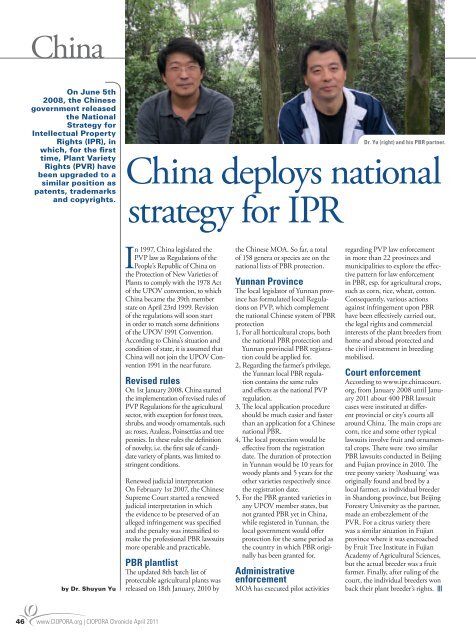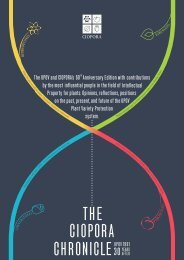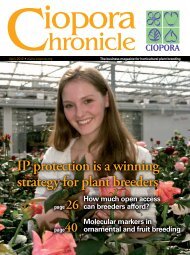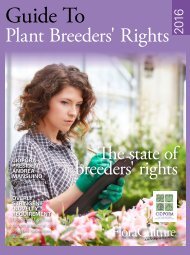2011 CIOPORA Chronicle - the 50th Anniversary Edition
CIOPORA annual magazine on Intellectual Property protection for plant innovations 2011. The magazine was produced in cooperation with FloraCulture International. Read in the 2011 CIOPORA Chronicle edition: - CIOPORA plays vital role in supporting the industry - PVR litigation on the rise - Plant Breeders´Right. Quo vadis? - China deploys national strategy for IPR - CIOPORA helps IP owners protect their rose varieties and much more...
CIOPORA annual magazine on Intellectual Property protection for plant innovations 2011. The magazine was produced in cooperation with FloraCulture International.
Read in the 2011 CIOPORA Chronicle edition:
- CIOPORA plays vital role in supporting the industry
- PVR litigation on the rise
- Plant Breeders´Right. Quo vadis?
- China deploys national strategy for IPR
- CIOPORA helps IP owners protect their rose varieties
and much more...
Create successful ePaper yourself
Turn your PDF publications into a flip-book with our unique Google optimized e-Paper software.
China<br />
On June 5th<br />
2008, <strong>the</strong> Chinese<br />
government released<br />
<strong>the</strong> National<br />
Strategy for<br />
Intellectual Property<br />
Rights (IPR), in<br />
which, for <strong>the</strong> first<br />
time, Plant Variety<br />
Rights (PVR) have<br />
been upgraded to a<br />
similar position as<br />
patents, trademarks<br />
and copyrights.<br />
Dr. Yu (right) and his PBR partner.<br />
China deploys national<br />
strategy for IPR<br />
by Dr. Shuyun Yu<br />
In 1997, China legislated <strong>the</strong><br />
PVP law as Regulations of <strong>the</strong><br />
People’s Republic of China on<br />
<strong>the</strong> Protection of New Varieties of<br />
Plants to comply with <strong>the</strong> 1978 Act<br />
of <strong>the</strong> UPOV convention, to which<br />
China became <strong>the</strong> 39th member<br />
state on April 23rd 1999. Revision<br />
of <strong>the</strong> regulations will soon start<br />
in order to match some definitions<br />
of <strong>the</strong> UPOV 1991 Convention.<br />
According to China’s situation and<br />
condition of state, it is assumed that<br />
China will not join <strong>the</strong> UPOV Convention<br />
1991 in <strong>the</strong> near future.<br />
Revised rules<br />
On 1st January 2008, China started<br />
<strong>the</strong> implementation of revised rules of<br />
PVP Regulations for <strong>the</strong> agricultural<br />
sector, with exception for forest trees,<br />
shrubs, and woody ornamentals, such<br />
as: roses, Azaleas, Poinsettias and tree<br />
peonies. In <strong>the</strong>se rules <strong>the</strong> definition<br />
of novelty, i.e. <strong>the</strong> first sale of candidate<br />
variety of plants, was limited to<br />
stringent conditions.<br />
Renewed judicial interpretation<br />
On February 1st 2007, <strong>the</strong> Chinese<br />
Supreme Court started a renewed<br />
judicial interpretation in which<br />
<strong>the</strong> evidence to be preserved of an<br />
alleged infringement was specified<br />
and <strong>the</strong> penalty was intensified to<br />
make <strong>the</strong> professional PBR lawsuits<br />
more operable and practicable.<br />
PBR plantlist<br />
The updated 8th batch list of<br />
protectable agricultural plants was<br />
released on 18th January, 2010 by<br />
<strong>the</strong> Chinese MOA. So far, a total<br />
of 158 genera or species are on <strong>the</strong><br />
national lists of PBR protection.<br />
Yunnan Province<br />
The local legislator of Yunnan province<br />
has formulated local Regulations<br />
on PVP, which complement<br />
<strong>the</strong> national Chinese system of PBR<br />
protection<br />
1, For all horticultural crops, both<br />
<strong>the</strong> national PBR protection and<br />
Yunnan provincial PBR registration<br />
could be applied for.<br />
2, Regarding <strong>the</strong> farmer's privilege,<br />
<strong>the</strong> Yunnan local PBR regulation<br />
contains <strong>the</strong> same rules<br />
and effects as <strong>the</strong> national PVP<br />
regulation.<br />
3, The local application procedure<br />
should be much easier and faster<br />
than an application for a Chinese<br />
national PBR.<br />
4, The local protection would be<br />
effective from <strong>the</strong> registration<br />
date. The duration of protection<br />
in Yunnan would be 10 years for<br />
woody plants and 5 years for <strong>the</strong><br />
o<strong>the</strong>r varieties respectively since<br />
<strong>the</strong> registration date.<br />
5, For <strong>the</strong> PBR granted varieties in<br />
any UPOV member states, but<br />
not granted PBR yet in China,<br />
while registered in Yunnan, <strong>the</strong><br />
local government would offer<br />
protection for <strong>the</strong> same period as<br />
<strong>the</strong> country in which PBR originally<br />
has been granted for.<br />
Administrative<br />
enforcement<br />
MOA has executed pilot activities<br />
regarding PVP law enforcement<br />
in more than 22 provinces and<br />
municipalities to explore <strong>the</strong> effective<br />
pattern for law enforcement<br />
in PBR, esp. for agricultural crops,<br />
such as corn, rice, wheat, cotton.<br />
Consequently, various actions<br />
against infringement upon PBR<br />
have been effectively carried out,<br />
<strong>the</strong> legal rights and commercial<br />
interests of <strong>the</strong> plant breeders from<br />
home and abroad protected and<br />
<strong>the</strong> civil investment in breeding<br />
mobilised.<br />
Court enforcement<br />
According to www.ipr.chinacourt.<br />
org, from January 2008 until January<br />
<strong>2011</strong> about 400 PBR lawsuit<br />
cases were instituted at different<br />
provincial or city’s courts all<br />
around China. The main crops are<br />
corn, rice and some o<strong>the</strong>r typical<br />
lawsuits involve fruit and ornamental<br />
crops. There were two similar<br />
PBR lawsuits conducted in Beijing<br />
and Fujian province in 2010. The<br />
tree peony variety ‘Aoshuang’ was<br />
originally found and bred by a<br />
local farmer, as individual breeder<br />
in Shandong province, but Beijing<br />
Forestry University as <strong>the</strong> partner,<br />
made an embezzlement of <strong>the</strong><br />
PVR. For a citrus variety <strong>the</strong>re<br />
was a similar situation in Fujian<br />
province where it was encroached<br />
by Fruit Tree Institute in Fujian<br />
Academy of Agricultural Sciences,<br />
but <strong>the</strong> actual breeder was a fruit<br />
farmer. Finally, after ruling of <strong>the</strong><br />
court, <strong>the</strong> individual breeders won<br />
back <strong>the</strong>ir plant breeder’s rights. |||<br />
46 www.<strong>CIOPORA</strong>.org | <strong>CIOPORA</strong> <strong>Chronicle</strong> April <strong>2011</strong>









